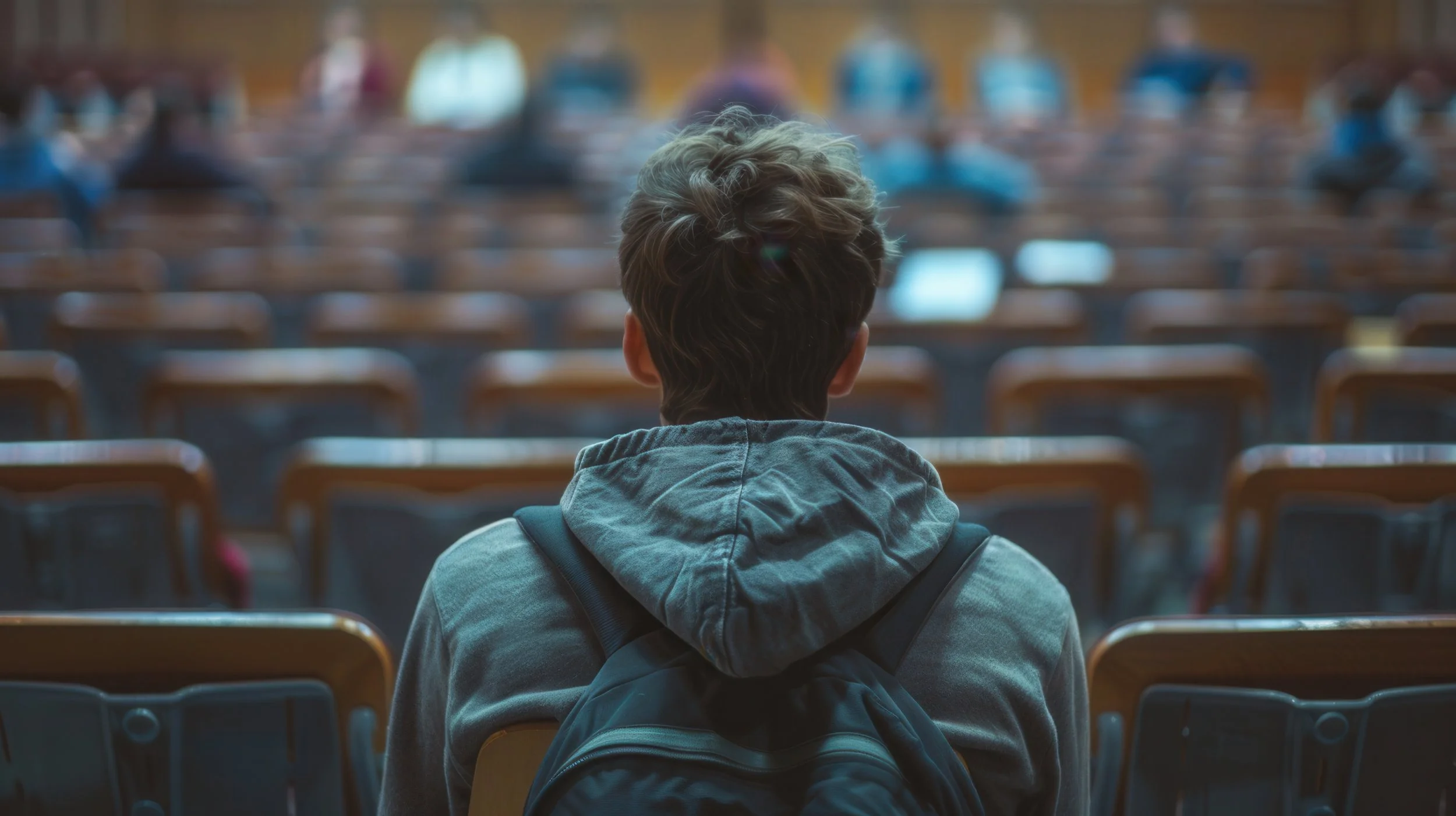Making Friends at University
Introduction
All meaningful friendships start with taking the first step: initiation. However, this can be the hardest part for some, as there are many things that could be holding you back. You might be scared of what people will think of you, or perhaps you’re just not sure how to approach them. The challenge of reaching out can ultimately prevent people from getting to know you, and you never know how many individuals you might truly connect with!
At U-Belong, we want to help you navigate the complex world of friendships, empowering and encouraging you to embrace the diversity that university offers. Created by students, researchers, and professionals, this page is tailored to help you step out into the university social world and make friendships that will last.
Understanding the Opportunities and Barriers to Socialising
Many students find it difficult to make friends at university. In 2023, the U-Belong team found that by the second term, 21% of students reported they hadn’t made friends they could trust and rely on, and 19% hadn’t made friends they would spend leisure time with. Additionally, 60% of students experienced anxiety around social situations.
What prevents us from socialising?
There are many factors that can deter us from socialising, which may subsequently reduce the quantity and quality of our social connections. Moving to university often promises a new beginning, offering ideal conditions to create new friendships and have the “time of your life.” When starting university, many students hear from family and friends about the importance of making friends as soon as possible.
However, this advice doesn’t always consider the numerous barriers that might stand in your way. Students report social hurdles such as fear of rejection, introversion, and practical challenges like lack of time and money [1]. Other challenges may include:
-
Lacking self-confidence can inhibit you from initiating social interactions due to fear of judgment [2]. You might also feel insecure about your social skills, which could lead to social anxiety and isolation [3].
-
Distancing yourself when feeling overwhelmed or stressed is common. At university, the most common (and understandable) reasons for feeling overwhelmed include being in a new environment, financial difficulties, and academic challenges, pressures, and expectations [4].
-
You may not know how or when to initiate social interactions, or past experiences might discourage you altogether. It’s important to explore what's available during the first week of university and see if any activities appeal to you personally. While Freshers’ Week is significant, there are plenty of other opportunities to initiate social interactions—not just in the first few weeks, but throughout the entire year. So, don’t worry if Freshers’ Week isn’t for you.
Do any of these resonate with you? Let’s explore each of these topics in more detail.
1) Self-confidence and self-esteem
Low self-esteem, or simply a lack of self-confidence, is not uncommon. Even the most confident-looking people can admit to feeling this way at least once or twice in their lives [5]. It’s a difficult feeling to cope with and often affects how we interact with others. When we have low self-esteem, we become more aware of our surroundings, our behaviours, and the reactions we might receive from others. Feeling embarrassed about something in front of others—like tripping in public or blurting out words without meaning—is all too common, but sometimes it leads to significant distress [6]. When you do or say something that elicits a “negative” reaction, you may start to fear judgment from others, lose confidence in your social skills, feel worse about yourself, and, ultimately, withdraw socially [7].
Furthermore, when people feel judged by others, negative self-conscious emotions tend to arise. You might deny any intentions, attempt to make amends or punish yourself internally and externally for something that probably won’t be remembered by anyone 24 hours later [8]. This is understandable, but it’s important to remember that everyone sometimes feels this way. What you might find displeasing about yourself may be liked by others.
Sometimes isolation and loneliness can make you want to be more social, but paradoxically, you might remove yourself from social situations due to a fear of rejection [9]. Psychologists have proposed an interpersonal hostility theory of loneliness, where feeling lonely heightens hypervigilance to perceived threats, negative judgment, and hostility from others, which in turn leads to more social isolation as a protective mechanism [10]. Feeling lonely and having low self-esteem can be linked and may involve navigating feelings of rejection, inadequacy as a friend, or being the ‘odd one out’ [9]. Being aware of this can help you challenge these thoughts and take the first steps toward connection.
2) Overwhelm and stress
There are many different stressors at university that aren’t discussed enough, leading to students feeling unprepared when they first start [11]. Common sources of distress among first-year students include the pressure to perform well in order to succeed, uncertainties around academic performance (such as adapting to a “new” grading system), the level of independence expected in learning, and the stress of learning to live and care for oneself.
Research has shown that the environment of your educational setting can affect your social and emotional skills, which in turn have a significant impact on your learning, retention, and academic performance [12]. When students first enter university, they’re often bombarded with a variety of activities and tasks associated with the transition to independent learning and living. This feeling of being overwhelmed can affect your sense of place and belonging at university and play a significant role in shaping your overall “student experience” [13; 14].
3) Initiating socialising
Socialising is often advertised as the best way to enjoy university life, but there is limited support for those who genuinely struggle to socialise, aside from interventions typically directed at the individual. These interventions—sometimes [15]—include social support (such as befriending or mentoring programmes), social skills and emotional competence training, and opportunities for social connection to expand one’s network [16]. However, these approaches are not always effective, as they often place the burden on the individual and treat social difficulties as a personal problem [17]. Evidence shows that students are frequently held individually responsible for making friends based on traits like confidence and extroversion, which overlooks broader power dynamics [18]. Many factors influence people’s ability to socialise, make connections, and develop lasting friendships.
Building meaningful connections is challenging, and many students are unaware that it takes time. There is often an immediate pressure to make friends at university, which can push people to step out of their comfort zones and form superficial bonds. Freshers’ Week, or Welcome Week, is a great opportunity for students to get to know their campus, environment, and peers better.
However, some students struggle to engage in these activities and feel pressured to participate, as it seems like the more rewarding option [19]. While the importance of friendship is emphasized in the literature, research shows that developing close friendships, particularly at university, does not happen overnight. It can be influenced by individual factors (such as low trust and introversion) [20] and external factors (such as socio-economic status) [20]. Studies on peer relationships, university adjustment, and university attachment indicate that positive peer relationships can enhance the student experience, but this process extends beyond the first year. Expect to make some friends in your first year, but continue building connections throughout your university journey, not just during the first week [21].
In fact, evidence from first-year students reflecting on their Freshers’ experiences found that Freshers’ Week did not significantly help them make friends [22]. However, they identified two types of people who were most helpful to approach:
-
Students who seemed similar to themselves (e.g., in clothing, accent, ethnicity, or behaviour) often contributed to feelings of safety and provided a good foundation for conversation starters [23].
-
Students on the same course tend to become good, long-term friends because they share similar experiences, interests, and possibly values.
Building a Plan of Action
Here are some ideas for actions that might help improve your sense of belonging. Each step can overlap and build on others, but some may be more relevant to your situation. While you may have heard some of this advice before—and we understand that it can be frustrating to hear the same suggestions repeatedly—we recommend these strategies because they have proven effective for many people in the past, as demonstrated by both research and personal anecdotes. Feel free to try something out and revisit or adjust as needed.
-
Learning to feel better about yourself is a crucial step in feeling better around others. While this is easier said than done, it’s something we can all work on. When you first start university, approach it with a positive outlook, and when trying to make friends, aim to be as authentic as possible. Some people might not instantly click with you, but you want friends who appreciate you for who you are. You may feel uncertain about yourself initially, but remember that someone will see you in a positive light. Stick with them. Remember, some students might already have established friend groups and little interest in meeting new people—it’s not a reflection of you. Learn how to navigate feelings of not being likable or good enough, and seek out communities that appreciate you.
-
Above all, know that you aren’t the problem! Navigating new environments is challenging, and external factors like financial worries and academic workload can affect your willingness to put yourself out there. Remember, you are not alone in this. Government research has shown that students often worry about being judged for loneliness, which can prevent them from seeking help; however, students generally do not judge others for admitting to loneliness [24].
-
Feeling prepared can help reduce overwhelm and increase your energy and resources for socialising. This might involve using a packing checklist, such as this, to ensure you don’t miss any essentials. Once at university, visit the campus before classes begin to familiarise yourself with your classroom, cafeteria, and study spaces. Explore the campus area to identify cafes, bars, and restaurants you might want to visit once classes start. This familiarity will help you feel more comfortable and prepared for socialising.
-
Starting with people who are physically close to you can be a great way to build confidence in making friends and gradually reach out to a more diverse set of people as you progress through your university journey.
-
Friendships can take time to develop, but being on the same course means you might see each other frequently. Group work can be an opportunity to meet people from your course, and if you get along, you might suggest additional study sessions with them. Taking interactions outside the classroom can solidify these connections [27]. The National Survey of Student Engagement found that 60% of first-year students often chat about their courses outside the classroom, making friends in the process [28].
-
Finding friends can be daunting, but putting yourself out there is the best way to start. Isolating yourself and avoiding socialising can lead to loneliness, which may worsen your mental health, academic performance, and overall well-being. Find a place where you feel comfortable and engage actively in conversations with your coursemates, society members, or other students you want to connect with. Step out of your comfort zone and explore new possibilities.
-
Explore the societies, networks, and clubs available at your university. These can provide common ground for connecting with others. 42% of students in the UK joined a society or club due to feeling lonely and found it to be the most helpful action they took [24]. LGBTQ+, trans, and non-binary events, as well as events related to your ethnicity or international status, may be good ways to develop connections. Be selective about joining societies you are genuinely interested in, as you won’t have time or energy for everything. Focus on quality over quantity. Volunteering opportunities can also be valuable, offering experience and connecting you with others who share your passions.
-
Reaching out and talking to people online can also boost your social life. 57% of students report having met new friends online [25], and for some, online communication and social media can help in making friends [26]. Just remember to be safe and cautious about the information you share with people you’ve just met online. Our friends over at Togetherall provide a fantastic online platform for this.
-
Spend time in common areas on campus or in your accommodation to comfortably expose yourself to opportunities to meet others. 87% of university students claim that eating together is a common way to socialise with friends, and more than 50% believe their campus dining hall is a key place to connect [29].
-
When feeling overwhelmed, some people worry about being a burden to others. Remember that it’s okay to seek support from your peers, but also consider their energy levels. Everyone has their own challenges, but devoted friends will support you.
Ask a Friend
Shifting Focus: Alyssia, one of our Student Research Assistants, shares her journey of shifting focus from trying to make friends at university to creating meaningful memories, which ultimately led to finding genuine connections.
Christina shares both the ups and downs of making friends at university in a candid video (Watch Time: 12 minutes): The Truth About Making Friends at Uni (youtube.com)
Max opens up about how it can be difficult to make friends at university, even if you have the intention to do so and try to put yourself out there (Watch Time: 15 minutes): Making Friends at University is Harder Than I Thought (youtube.com).
Lydie and Hazal discuss important considerations when making friends at university, highlighting that friendships in which you are expected to change yourself are not sustainable (Watch Time: 1 minute): Finding Friends at University (youtube.com).
Emma discusses some of the regrets she has from her first year of university, especially around making friends (Watch Time: 3 minutes): First Year University Advice and Regrets (youtube.com).
Sam discusses the realities of university life, sharing his experience of loneliness at Oxford (Watch Time: 9 minutes): I Am Lonely at Oxford University (youtube.com).
This episode of the Calm it Down podcast explores why we feel lonely even when surrounded by people and how it can be hard to make friends as adults (Listen Time: 27 minutes): Embracing Connection in a Lonely World | Calm it Down (youtube.com).
Our friends over at Student Minds have a wealth of blogs written by students, for students, on friendships and relationships at university: Student Minds Blog: Friends and Relationships.
Share Your Story: Help fellow students learn from your experiences and feel less alone. Contribute to Student Minds, the UK’s leading student mental health charity, and ensure your voice reaches those who need it most.
What Other Support Is Available?
-
A website dedicated to helping individuals improve their social skills, targeted towards adults and older teenagers. Succeed Socially.com | Free Social Skills Guide For Adults
-
From the team behind Student Minds, Student Space is a platform that allows students to access support, information, and advice. This page specifically focuses on making friends and managing your social life at university. Friendships and Social Life (studentspace.org.uk)
-
This page provides guidance on managing low self-esteem and includes a short video on countering negative thoughts with positive thinking. Raising Low Self-Esteem - NHS (www.nhs.uk)
-
Teesside University offers open-access resources for making friends at university, including conversation starters for when you meet new people. Initial Tips and Conversation Starters - How to Meet People and Make Friends at University - LibGuides at Teesside University
-
Published by the Charlie Waller Trust, this guide offers advice on meeting new people at the start of university (Read Time: 5 minutes). Meeting New People (charliewaller.org)
-
Also published by the Charlie Waller Trust, this guide provides advice on living with new people at the start of university (Read Time: 5 minutes). Living with New People (charliewaller.org)
-
Another guide from the Charlie Waller Trust, offering advice on joining clubs and societies at the start of university (Read Time: 5 minutes). Joining Clubs and Societies (charliewaller.org)
-
This guide by the Charlie Waller Trust provides advice on navigating social life and friendships at the start of university (Read Time: 5 minutes). Social Life and Friendships (charliewaller.org)
Explore related topics:
Help us improve:
Check out our webinars:
Check Out Our Sources:
Apostolou, M., & Keramari, D. (2020). What prevents people from making friends: A taxonomy of reasons. Personality and Individual Differences, 163, e110043. https://doi.org/10.1016/j.paid.2020.110043
Harris, M., & Orth, U. (2019). The link between self-esteem and social relationships: A meta-analysis of longitudinal studies. Journal of Personality and Social Psychology, 119(6), 1459–1477. https://doi.org/10.1037/pspp0000265
Miers, A., Blöte, A., & Westenberg, P. (2009). Peer perceptions of social skills in socially anxious and nonanxious adolescents. Journal of Abnormal Child Psychology, 38(1), 33–41. https://doi.org/10.1007/s10802-009-9345-x
McIntyre, J., Worsley, J., Corcoran, R., Harrison Woods, P., & Bentall, R. (2018). Academic and non-academic predictors of student psychological distress: The role of social identity and loneliness. Journal of Mental Health, 27(3), 230-239. https://doi.org/10.1080/09638237.2018.1437608
Smulders, Y. (2018). Distrusting confidence. The Netherlands Journal of Medicine, 76(2), e51. https://www.njmonline.nl/getpdf.php?id=194
Thomas, K., DeScioli, P., & Pinker, S. (2018). Common knowledge, coordination, and the logic of self-conscious emotions. Evolution and Human Behavior, 39(2), 179–190. https://doi.org/10.1016/j.evolhumbehav.2017.12.001
Rodebaugh, T., Grossman, J., Tonge, N., Shin, J., Frumkin, M., Rodriguez, C., Ortiz, E., & Piccirillo, M. (2024). Avoidance and fear day by day in social anxiety disorder. Psychotherapy Research, 1–14. https://doi.org/10.1080/10503307.2023.2297994
Helbig-Lang, S., von Auer, M., Neubauer, K., Murray, E., & Gerlach, A. (2016). Post-event processing in social anxiety disorder after real-life social situations – An ambulatory assessment study. Behaviour Research and Therapy, 84, 27–34. https://doi.org/10.1016/j.brat.2016.07.003
Achterbergh, L., Pitman, A., Birken, M., Pearce, E., Sno, H., & Johnson, S. (2020). The experience of loneliness among young people with depression: A qualitative meta-synthesis of the literature. BMC Psychiatry, 20(1), e415. https://doi.org/10.1186/s12888-020-02818-3
Segel-Karpas, D., & Ayalon, L. (2020). Loneliness and hostility in older adults: A cross-lagged model. Psychology and Aging, 35(2), 169–176. https://doi.org/10.1037/pag0000417
Thompson, M., Pawson, C., & Evans, B. (2021). Navigating entry into higher education: The transition to independent learning and living. Journal of Further and Higher Education, 45(10), 1398–1410. https://doi.org/10.1080/0309877x.2021.1933400
Garibaldi, M., & Josias, L. (2015). Designing schools to support the socialisation processes of students. Procedia Manufacturing, 3(3), 1587–1594. https://doi.org/10.1016/j.promfg.2015.07.446
Holdsworth, C. (2009). Between two worlds: Local students in higher education and “scouse”/student identities. Population, Space and Place, 15(3), 225–237. https://doi.org/10.1002/psp.511
Holdsworth, C. (2006). “Don’t you think you’re missing out, living at home?” Student experiences and residential transitions. The Sociological Review, 54(3), 495–519. https://doi.org/10.1111/j.1467-954x.2006.00627.x
National Academy for Social Prescribing (n.d.) What is Social Prescribing? Available at: https://socialprescribingacademy.org.uk/what-is-social-prescribing/ (Accessed: 07 September 2024).
Eccles, A., & Qualter, P. (2021). Review: Alleviating loneliness in young people – a meta‐analysis of interventions. Child and Adolescent Mental Health, 26(1), 17-33. https://doi.org/10.1111/camh.12389
Barreto, M., Doyle, D., & Qualter, P. (2024). Changing the narrative: Loneliness as a social justice issue. Political Psychology. 45(1), 157-181. https://doi.org/10.1111/pops.12965
Read, B., Burke, P., & Crozier, G. (2018). “It is like school sometimes”: Friendship and sociality on university campuses and patterns of social inequality. Discourse: Studies in the Cultural Politics of Education, 41(1), 70–82. https://doi.org/10.1080/01596306.2018.1457626
Davlembayeva, D. & Alamanos, E. (2023) Social Exchange Theory: A review. In S. Papagiannidis (Ed), TheoryHub Book. Available at https://open.ncl.ac.uk / ISBN: 9781739604400
Raabe, I., la Roi, C., & Plenty, S. (2024). Down and out? The role of household income in students’ friendship formation in school classes. Social Networks, 78, 109–118. https://doi.org/10.1016/j.socnet.2023.12.003
Maunder, R. (2017). Students’ peer relationships and their contribution to university adjustment: The need to belong in the university community. Journal of Further and Higher Education, 42(6), 756–768. https://doi.org/10.1080/0309877x.2017.1311996
Shaw, J. (2020) The importance of student friendships, The Higher Education Policy Institute. Available at: https://www.hepi.ac.uk/2020/10/12/the-importance-of-student-friendships/ (Accessed: 07 September 2024).
HelpGuide.org. (2024) Loneliness and social isolation. Available at: https://www.helpguide.org/relationships/social-connection/loneliness-and-social-isolation (Accessed: 07 September 2024).
GOV.UK (2023) New government research shows ‘lonely’ seems to be the hardest word for students. Available at: https://www.gov.uk/government/news/new-government-research-shows-lonely-seems-to-be-the-hardest-word-for-students (Accessed: 07 September 2024).
Lenhart, A., Smith, A., Anderson, M., Duggan, M., & Perrin, A. (2015). Teens, technology and friendships. Available at: http://www.pewinternet.org/2015/08/06/teens-technology-and-friendships/ (Accessed 07 September 2024).
Hsieh, A., Lo, S., Chiu, Y., & Hwang, Y. (2023). Social anxiety and online media choice: Visual anonymity as a key. International Journal of Human-Computer Interaction, 1–7. https://doi.org/10.1080/10447318.2023.2278303
Archbell, K., & Coplan, R. (2021). Too anxious to talk: Social anxiety, academic communication, and students’ experiences in higher education. Journal of Emotional and Behavioral Disorders, 30(4), 273-286. https://doi.org/10.1177/10634266211060079
Eser, A. (2024) College making Friends statistics: Loneliness, social anxiety, and friendship challenges, Worldmetrics.org. Available at: https://worldmetrics.org/making-friends-in-college-statistics/ (Accessed: 07 September 2024).
Sodexo US (2022) More than 50% of Gen Z College students report feeling lonely according to Sodexo Student Lifestyle Survey. Available at: https://us.sodexo.com/newsroom/2022/gen-z-college-students-lonely (Accessed: 07 September 2024).











